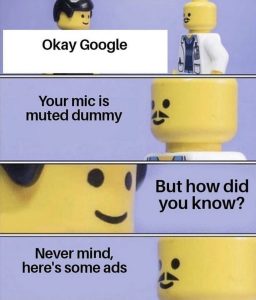 If you’ve noticed recently there has been a boom in organic dog food companies. And the clever advertising that they’re deploying. I was having a conversation with a friend about it one night. Just a few hours later, I logged into Instagram to be hit with an ad for subscription dog food. Delivered. Monthly. and yes, organic. The crazy part is, I don’t even have any dogs! And sure enough this type of story – about having a convo only to get hit with an ad about that topic shortly after – is not unique to me. Stories like this are not uncommon. Which begs to question…
If you’ve noticed recently there has been a boom in organic dog food companies. And the clever advertising that they’re deploying. I was having a conversation with a friend about it one night. Just a few hours later, I logged into Instagram to be hit with an ad for subscription dog food. Delivered. Monthly. and yes, organic. The crazy part is, I don’t even have any dogs! And sure enough this type of story – about having a convo only to get hit with an ad about that topic shortly after – is not unique to me. Stories like this are not uncommon. Which begs to question…
Does Google listen to me?
The short answer is, yes – Siri, Alexa and Google Voice do listen to you. By default, the factory settings have microphone on. Why? Because Siri, Alexa, and Google Voice need to listen to you to optimize their natural language processing. They need – as the user of the phone – to train them to hear. For example – if you say their name, they’ll respond. But you might say it weird, or with a cough. Or say it from far. So they need to be “trained” to hear you, and that happen with an active mic. Simple enough. And that’s fine with most people, given the microphone has to stay “alert” in case you call on a virtual assistant to do something for you. But does it stop there? Do humans listen to us too?
Do humans at big tech firms listen to us?
Again, the short answer is yes. In order to optimize the voice technology used by virtual assistants, the big tech firms need to update their algorithms. And that requires more than just coding, i.e. it requires a human actually listening.
The fact that humans at big tech firms listen to us has been disclosed publicly by Amazon and Google. Some analysts listen to 1,000+ voice clips per shift! This is fine enough for most, but tends to bother people more than just Siri or Alexa listening in for any remote commands. Who wants humans listening to us? Not many people. But for the advancement of technology, most people are okay with this because it results in better technology, better products and a better standard of living. But this begs to another question… does Google listen to me for ads?
Does Google listen to me for ads though?
Or Facebook? Instagram? We suspect the answer is absolutely yes. Unless all the conversations you’ve heard about this, all the times you’ve experienced this, and the controlled experiment done by a Vice reporter are complete coincidence (not likely!). In the experiment, the reporter made sure his microphone settings were on, and said certain phrases repeatedly throughout the week. Almost overnight, ads started to appear for the things he mentioned – similar to my instance with dog food. But isn’t this all illegal?
Is it legal for advertisers to listen to my phone?
In America, we live in a society where contractual relationships prevail where the law is silent. So if Congress or state legislatures haven’t outright banned advertisers from using voice data, it’s technically not illegal. The answer is: it depends on the user agreement. Many tech companies, including app developers – after the Vice experiment which triggered hundreds of others – have added a clause to their User Agreement, allowing them to use voice data for targeted advertising purposes.
“These user agreements explicitly state recorded audio may be used for targeted advertising purposes. Interestingly, such practices aren’t against the law. This action allows tech companies to push the privacy boundaries even further to encourage us to buy things we don’t need.”
You’re not paranoid. Your phone really is listening in (Fox News)
How can I prevent being listened to?
The first step is to review the user agreement for language that says they can use your voice data for targeted advertising purposes. If that’s the case, delete the app or stop using that service altogether. If you’d like to carte blanche the approach, then turn your microphone off. From most smart phones, within your settings there should appear a microphone option. If you click it, you will see all the apps that use the microphone – Snapchat, Instagram, etc. Many of these apps will fail to work properly if you completely turn off the microphone, so it’s probably best to read the user agreements (if you’re willing!) and turn them off one by one.
Read: OAREX now offers digital media factoring at 0.99% per month
